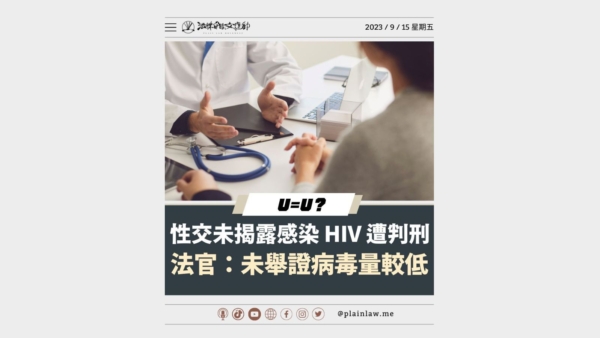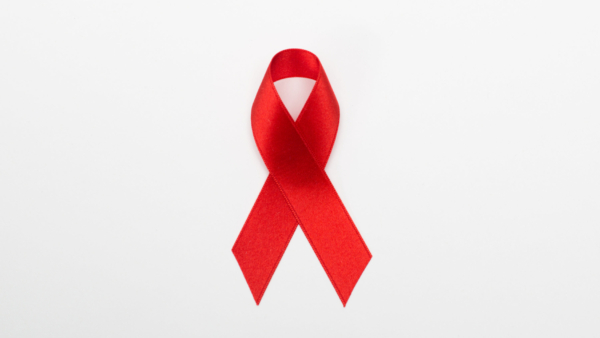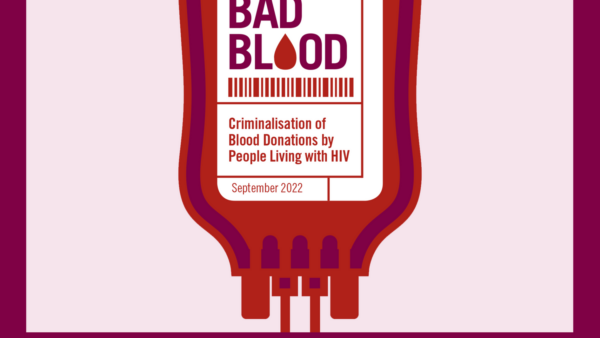Overview
Taiwan’s HIV Infection Control and Patient Rights Protection Act, originally enacted in 1990, criminalises alleged HIV ‘exposure’ and non-disclosure.
Article 21 makes it a crime for a person who knows they are living with HIV to have ‘unsafe’ sex (to be defined by the ‘central competent authority’), share injecting equipment, or make a blood donation or provide organs, tissues, body fluids or cells for transplantation without disclosing their HIV status (see our report, Bad Blood, for a global analysis of the criminalisation of blood donations). The sentence under this provision ranges from five years up to twelve years’ imprisonment, having been increased in 2007 from the original penalty of up to seven years’ imprisonment.
The law states that both transmission, and ‘attempts’ at transmission (i.e. ‘exposure’), are equally liable to this punishment. However, in recent years there have been judicial and policy developments which have limited the scope of criminalisation in Taiwan to only those acts involving a risk of transmission.
In 2016, a challenge to the law was lodged by the Persons with HIV/AIDS Rights Advocacy Association of Taiwan (PRAA) in the Constitutional Court but did not proceed.
In 2019, the Taipei District Court convicted a gay man living with HIV of having condomless sex without disclosing his HIV-positive status, as prohibited by Article 21. He was given a reduced sentence of 17 months’ imprisonment, as permitted under Article 59 of the Criminal Code which allows for reduced punishment in ‘extenuating circumstances’, in this case because HIV was not transmitted.
In May 2020, a man living with HIV was convicted for having oral sex, and allegedly penetrative sex, with a partner without disclosing his status. The defendant was sentenced to a year’s imprisonment in the first instance, however in June 2020 he was acquitted by the High Court. In reaching its verdict the appeal court relied upon the latest international medical guidance by UNAIDS which recommends that there should be no use of the criminal law for cases where there is no risk of transmission. The court found that as there was a lack of evidence that sexual intercourse occurred, the risk of transmission for oral sex without ejaculation is zero, and transmission did not in fact take place in this case, the defendant should be acquitted. In July 2022 the Supreme Court upheld the acquittal.
In July 2021, the Ministry of Health and Welfare updated its guidance on Criteria of Unsafe Sexual Behaviour, delegated to it under Article 21 of the HIV Infection Control and Patient Rights Protection Act, defining ‘unsafe’ sex as that involving a ‘significant risk of infection and causing HIV infection’. In effect, this should exclude cases where protection such as condoms is used, where the person has an undetectable viral load, and where the sexual act does not carry a risk of transmission.
Empirical studies of prosecution data in Taiwan have revealed a relatively high rate of criminalisation at 30 cases, substantially more than the five media-reported cases we are aware of. Where media reports are available, they often involve sensationalist reporting. For instance, a case reported in 2012 involved a gay man in Taipei who was, implausibly, alleged to have transmitted HIV to 50 men during sex parties.
A study of prosecution data to 31 December 2019 undertaken by PRAA, found a total of 20 prosecutions involving 21 defendants, 17 of which resulted in a conviction, with three returning not guilty verdicts. Thirteen of these convictions only involved ‘exposure’/non-disclosure, with only four cases of transmission. At least four additional cases were recorded but not prosecuted, while seven further cases were threatened but did not enter legal proceedings. Eleven cases involved men who have sex with men (MSM), while nine cases involved heterosexual sex, the majority (9) of which were male defendants. The longest sentence imposed was 134 months which was for a case involving thirteen alleged sexual contacts.
A further study conducted in January 2024 found a total of 26 individual court cases involving 37 defendants, half of which went to appeal, and seven of which went all the way to the Supreme Court. This study found that in trials which took place prior to the 2021 reform, 24 out of 25 defendants were convicted. In most cases, the defendants were accused only of ‘exposure’ The cases involved 35 sexual acts (27 MSM, seven heterosexuals, one unknown) and two needle-sharing offences.
Laws
HIV Infection Control and Patient Rights Protection Act
Article 21
Individuals who are fully aware that they are infected have, by concealing the fact, unsafe sex with others or injections by sharing needles and syringes, diluted fluids or containers, and thus infect others, shall be sentenced for five years up to twelve years.
Individuals who are fully aware that they are infected and supply blood or provide organs, tissues, body fluids or cells for transplantation or for use by others, and thus infect others, shall be sentenced the same.
Unaccomplished offenders of the preceding two Paragraphs shall be punished.
The definition of unsafe sex shall be formulated by the central competent authority following the relevant regulations outlined by the World Health Organization.
Further resources
Analysis of HIV criminalisation cases in Taiwan up to 31 December 2019.
This study searched for empirical studies discussing the effects of HIV criminal laws on public health from PubMed and collected twenty-six district court judgments involving 37 defendants charged with criminal HIV transmission from the Judicial Yuan Judgment Court Decisions Inquiry database.
Acknowledgements
Our thanks to PRAA, The Persons with HIV/AIDS Rights Advocacy Association of Taiwan, for their research assistance to confirm current relevant legislation.
HIV Justice Network's Positive Destinations
Visit the Taiwan (ROC) page on Positive Destinations for information on regulations that restrict entry, stay, and residency based on HIV-positive status, as well as access to HIV treatment for non-nationals.





